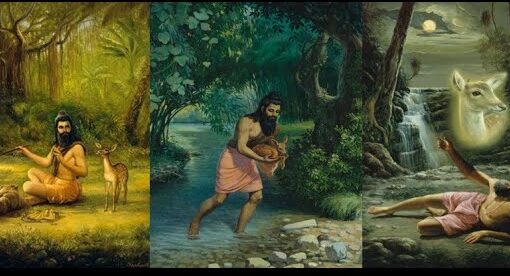Knowledge Received by Submissive Inquiries and Service
In today’s world, education often comes with a hefty price tag. Universities, training programs, and professional courses are marketed as commodities, where knowledge is exchanged for money. While this system has its merits, it tends to reduce learning to a transactional exchange, often devoid of humility, service, and higher purpose. In contrast, the Vedic tradition emphasizes a radically different approach to acquiring knowledge: submissive inquiries and service to a bona fide spiritual teacher. This method transcends material transactions, unlocking wisdom that transforms the heart and connects the seeker with eternal truths.
Krishna Himself underscores this principle in the Bhagavad-gita:
“Just try to learn the truth by approaching a spiritual master. Inquire from him submissively and render service unto him. The self-realized soul can impart knowledge unto you because he has seen the truth.” (Bhagavad-gita 4.34)
The Śrīmad-Bhāgavatam, a treasure trove of spiritual wisdom, offers several examples of how knowledge imparted through humility and service has led to profound transformations. By contrasting these examples with modern practices, we can better appreciate the enduring value of this time-tested method.
The Vedic Model: Learning Through Submission and Service
1. Narada Muni’s Early Life
Narada Muni’s journey from a simple boy serving traveling sages to becoming a transcendental spiritual teacher illustrates the power of submissive inquiries and service.
In the Śrīmad-Bhāgavatam, Narada recounts his story to Vyāsadeva, explaining how he served the sages with devotion and humility. By their mercy, he was allowed to partake in their remnants and hear their discussions about Krishna. This service and submissive attitude purified his heart and made him a suitable recipient of transcendental knowledge.
“In that association, and by the mercy of those great souls, I could hear them describe the attractive activities of Lord Krishna. Thus listening attentively, my taste for hearing of the Personality of Godhead increased at every step.” (Śrīmad-Bhāgavatam 1.5.26)
Narada’s life reminds us that true knowledge comes not through payment or entitlement but through a service attitude that opens the heart to divine wisdom.
2. Dhruva Mahārāja’s Determination
Another powerful example is the story of Dhruva Mahārāja. As a young boy, Dhruva sought the blessings of Lord Vishnu to fulfill a material desire. Guided by the sage Narada, Dhruva engaged in intense devotional service, following strict spiritual practices.
Through humility and surrender, Dhruva transcended his material ambitions and received not only Vishnu’s darshan but also eternal wisdom about life’s ultimate purpose.
“Lord Vishnu, being very pleased with Dhruva Mahārāja, blessed him and imparted transcendental knowledge, which brought Dhruva to a state of pure devotion.”
Dhruva’s transformation illustrates that service and submission make the seeker receptive to spiritual truths far greater than material rewards.
3. Sukadeva Gosvami and King Parikṣit
The dialogue between Sukadeva Gosvami and King Parikṣit in the Śrīmad-Bhāgavatam epitomizes the Vedic model of learning. Facing imminent death, Parikṣit renounced his kingdom and humbly sought transcendental knowledge from Sukadeva Gosvami.
Parikṣit’s submissive inquiries and focused attention on Sukadeva’s teachings allowed him to attain liberation within seven days. This exchange demonstrates the power of humility and the effectiveness of acquiring knowledge with a sincere heart.
“O great sages, I pray that you all continue to speak about the activities of the Lord so that I, who am dying, can hear with full attention.”
Modern Education: Transactional and Materially Oriented
In stark contrast, modern education is often a commercialized system, where knowledge is treated as a product and students as customers. Consider the following examples:
1. Cost of Higher Education
Universities worldwide charge exorbitant fees, making education inaccessible to many. While students acquire technical skills or qualifications, the deeper purpose of education—developing character and understanding life’s higher values—is often overlooked.
- Example: A student may pay thousands of dollars to learn management skills but lack the ethical grounding to use those skills responsibly. Without humility or service, knowledge can easily become a tool for exploitation rather than upliftment.
2. Focus on Career, Not Character
Modern education prioritizes career advancement over moral or spiritual development. While this system produces skilled professionals, it often fails to cultivate qualities like humility, compassion, and selflessness.
- Example: Despite technological advancements, the world still grapples with corruption, inequality, and environmental degradation—issues that stem from a lack of moral and spiritual wisdom.
3. Superficial Learning
In many cases, education today emphasizes memorization and passing exams over deep understanding. This approach creates individuals who may excel in academics but struggle to find meaning or purpose in life.
- Example: A graduate with multiple degrees may still feel unfulfilled, lacking the inner satisfaction that comes from self-realization.
Contrasting Examples: The Transformative Power of the Vedic Approach
1. Life of Śrīla Prabhupāda
Śrīla Prabhupāda’s journey in spreading Krishna consciousness exemplifies the transformative power of knowledge received through service and surrender. As a disciple of Śrīla Bhaktisiddhānta Sarasvatī, Prabhupāda served his spiritual master with humility and dedication.
His spiritual master instructed him to preach Krishna consciousness in the English-speaking world. Prabhupāda’s submissive acceptance of this instruction and his life of service resulted in a global movement that continues to transform millions of lives.
2. Modern Devotees Finding Fulfillment
Many devotees in ISKCON have shared how studying the Bhagavad-gita and Śrīmad-Bhāgavatam under the guidance of qualified teachers has transformed their lives. These texts provide answers to life’s most pressing questions—answers not found in conventional education systems.
- Case Study: A corporate professional struggling with stress and dissatisfaction turned to Krishna consciousness. By serving in a temple, chanting the holy names, and studying the scriptures, he found peace and purpose that no degree or promotion had ever provided.
Why Submissive Inquiries and Service Work
- Opens the Heart
Knowledge imparted through service and humility bypasses ego and goes straight to the heart. This creates a fertile ground for wisdom to take root and transform. - Transforms Character
Unlike transactional learning, the Vedic approach emphasizes character development alongside intellectual growth. By serving the teacher and following their guidance, the student cultivates virtues like humility, discipline, and gratitude. - Connects to the Divine
Spiritual knowledge is not merely intellectual; it is experiential. Service and submission align the seeker with Krishna’s grace, allowing divine wisdom to manifest.
Applying the Principle in Modern Life
While not everyone may have access to a traditional guru or ashram, the principles of submissive inquiries and service can still be applied:
- Seek Genuine Teachers
Look for mentors who embody the knowledge they share, whether in spiritual or professional contexts. Approach them with respect and a willingness to learn. - Engage in Service
Offer your skills, time, or resources to a cause that aligns with higher values. Serving with humility opens the heart to deeper insights. - Cultivate Humility
Acknowledge that true knowledge requires more than intellect—it demands an open and receptive heart. - Study with Intention
Read the Bhagavad-gita or Śrīmad-Bhāgavatam with the goal of applying their teachings in daily life, not just accumulating information.
Closing Thoughts
Knowledge received through submissive inquiries and service is not just more effective—it is transformative. This method goes beyond intellectual understanding, touching the heart and aligning the seeker with life’s ultimate purpose.
As Srila Prabhupāda beautifully said:
“Real education means to develop the qualities of a perfect gentleman and a devotee of God.”
As we navigate the complexities of modern life, let us draw inspiration from the Vedic tradition and prioritize learning that uplifts, purifies, and connects us with Krishna. In doing so, we can transcend the limitations of transactional education and embrace a path of wisdom that leads to true fulfillment.




